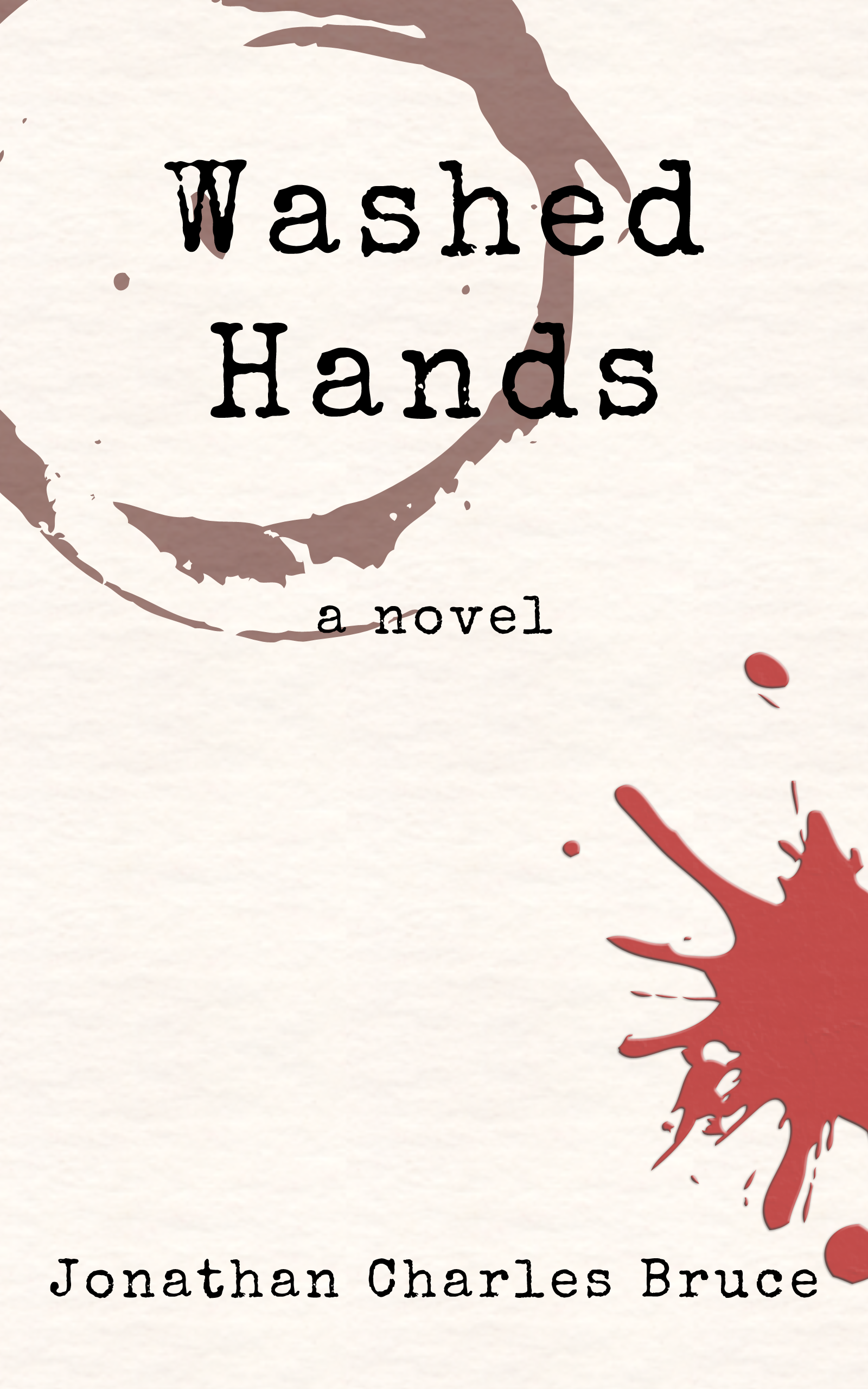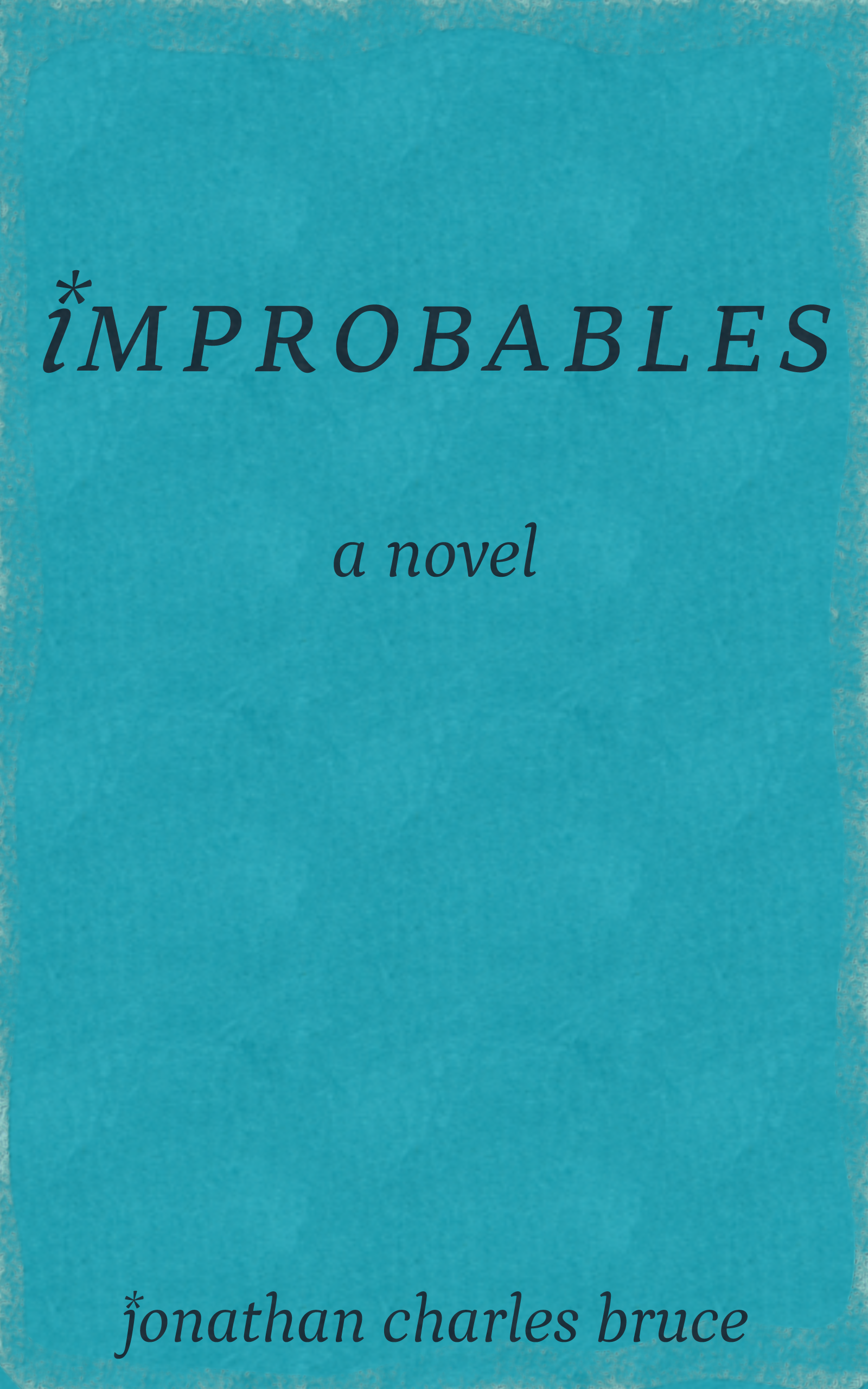Dreams of Familiar Vengeance
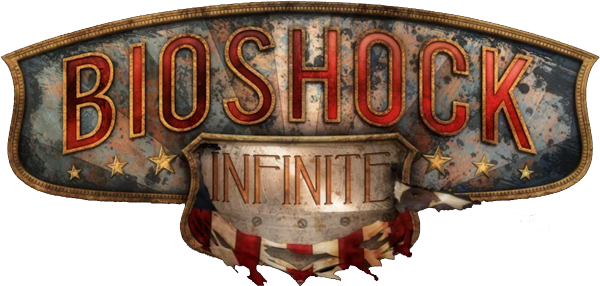
Review and Retrospective
It’s almost been a full four months since Bioshock Infinite was released. It’s also only been about a week since it went on sale during the Steam Summer Sale and I was able to get my grubby mitts on it without having to sell vital organs. If you can’t tell by now, I’m going to prattle on about a game that most have already discussed and moved on from. However, I get to call this a straight-up review as opposed to post-mortem, because there’s supposed to be delicious expansions available at the end of this month.
Wait... is DLC considered an expansion? It seems like it should be.
If you were looking forward to a preacher murdering simulater, you will be disappointed.
Also, Nico Vega is awesome and you are terrible if you think otherwise.
Anyway, Bioshock Infinite comes from the long line of titles that have the word ‘shock’ in their name. Some of the more frequent readers probably stumbled on my review of System Shock 2, the spiritual prequel of this game series. What the games have in common on the development side – outside of the bastard child of the series, Bioshock 2, and its progenitor System Shock – is Ken Levine, game designer and writer and all-around gifted maniac. Broader than that, the games have a commitment to story and tone that is seldom seen in first-person games, even if the heavy reliance on audio-logs is a bit of a crutch. Even if the mechanisms for logorrheic residents of spaceships, floating cities, and underwater metropolises do get a touch silly, it’s still infinitely better than Resident Evil’s approach of scrawling whatever goddamn thing is on your mind on whatever detritus is available.
Sorry, got off track.
I will get into spoiler-rific territory later, but here’s the gist of the story up to the opening acts of the game: it is 1912 and you are Booker DeWitt, drunken and indebted private detective who is hired to find a girl named Elizabeth in the city of Columbia. The thing is that this is an alternate 1912, and Columbia is a flying city running on the power of suspension of disbelief. Or scientific gobbledygook, take your pick. Further complicating things is the fact that the city is run by the Prophet Comstock, an ultra-nationalistic religious zealot who’s totally cool with other races provided they’re dead or on fire. This guy apparently had a vision of you wrecking the city’s collective shit, so everyone is a little wary of your presence – and by that I mean they want to kill you.
Since this is a game, let’s move onto the gameplay instead of just discussing the plot like the sweaty literature nerds we secretly are. By this point in time, the development team clearly knows how to make a good first-person action-fest. By that I mean you point at things, click, and the mans fall down. Although you can use iron-sights, your accuracy is already pretty amazing without it. It seems like a silly thing to bring up, but I slogged through Resident Evil: Operation Raccoon City wherein everybody aimed like drunken ocelots and every bullet had the same impact of a baby’s laugh. There’s no cover mechanic, meaning that you have to be smart enough to put things between your foes and yourself without the aid of a magic velcro button. In short, the combat in this game has more to do with Doom than Call of Duty, and as such is actually intense and enjoyable.
And yet, Infinite doesn’t get out of the modern era without a recharging shield, which can turn firefights into equal parts gunning while laughing maniacally and bunny-hopping toward a dark corner so you can resume tanking hits. It also only has two weapon slots, which makes experimenting with different tools a little hazardous for your health.
But you won’t feel too at a loss by the lack of gunishment variety: you also have ‘vigors,’ which is to Infinite’s universe what ‘plasmids’ were to the other Bioshocks. That is to say, they’re magic. You can shoot dudes with one hand while lighting them on fire with the other, and there are very few people that can tell me that shooting fucking crows out of your arm isn’t simultaneously awesome and hilarious. The only problem I have with them is that they seem really out of place in this story. As Yahtzee points out in his review, plasmids were an integral part of the narrative of Bioshock. Here, the vigors are there and that’s about it. I was honestly expecting some kind of plot twist connecting these little magical whatsits to the first Bioshock, but nope. Not gonna have it.
One of the big improvements to the combat is the inclusion of ‘skylines’ above (and below) certain arenas. Early in the game, you steal a grappling-hook thing and have the ability to glide along the skylines, wreaking horrible vengeance from above or (more likely) running away to have a little cry. It’s refreshing that these are actually fully playable segments of the game rather than cutscenes, as it makes actually utilizing the map a complete strategic joy – shoot a dude in the face, hop on a skyline, shoot at an incoming flying skiff full of other dudes, and then leap off the skyline on top of another dude who thought you were still playing with the first guy’s corpse.
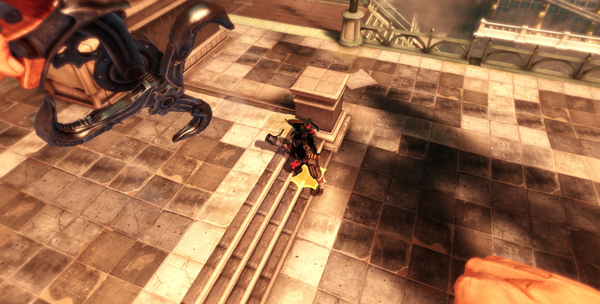
Hope you didn't need your face!
The other, major improvement is Elizabeth, your NPC support character who can manipulate time and space. You do spend a large chunk of the game escorting her around Columbia, which on paper seems like a bad idea – escort missions are ranked slightly below the obligatory sewer level on things people hate in video games. Elizabeth, however, is ignored by enemies, characterized really well, and actually tosses you helpful stuff in the middle of battle. Run out of magic-juice? Don’t disengage to search for more, because that will break the flow. Instead, keep shooting the racist shitheads in the face until Elizabeth finds some, shouts for your attention, then you hit a button and grab the powerup she tosses to you.
It’s such an excellently implemented system that I only really wish she had slightly more autonomy – outside of her helpful “Found a gun!” outbursts, she does rely on you to tell her what reality to alter instead of just thinking for herself. I don’t think that having an NPC character think to herself, Booker’s pinned down – maybe I should summon a turret over there to help, is really asking a lot. This ties in further to how well (despite this sigh-worthy trait) she and the characters are presented.
Without a doubt, the two lead characters – Booker and Elizabeth – are really excellent. Unlike your average space marine, the two are just bursting with a certain charm, making them sympathetic and enjoyable. One doesn’t merely root for Booker because its his body we’re stealing – there’s a genuine emotional link between player and character. Or maybe it’s me – there is something about angry misanthropes that just rubs me the right way. Elizabeth, too, is really well characterized, which ultimately is a shame because she’s constantly being fought over and relies on Booker to save her. I mean, I get it – removing agency from the player is a bad idea. And I’m not saying she should have become a violent mass murderer at some point, but, as mentioned above, outside of a few points, she really is just along for the ride. Which is silly, because it is just as much her story as it is Booker’s.
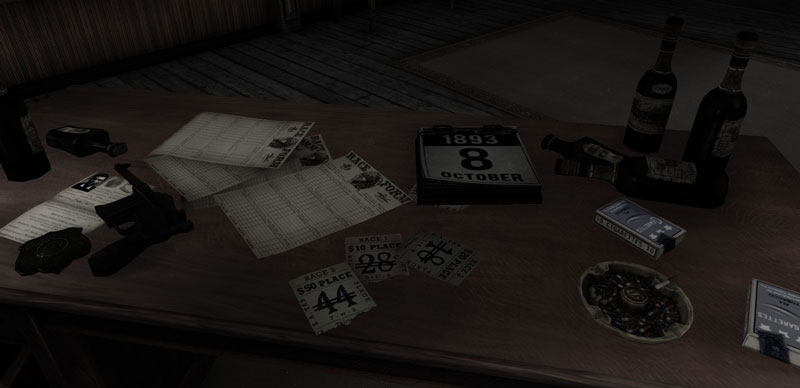
One man can't be responsible for ALL this drinking and depression.
But it isn’t just about them. Someone once said a narrative is only as good as your villains – that was me and possibly others but they don’t count – and Comstock is an alright villain. He’s you’re typical religious zealot with delusions of grandeur. And that’s alright for this narrative. What really sells him is his excellent voice acting and ominous self-aggrandizing. Other villains are bit players, but anything more than what was encountered in the story may have possibly ruined what is a fairly strong dynamic between Booker, Elizabeth, and Comstock. Of course, tying all these characters together is the world they live in, and what a world it is.
In terms of graphics, there’s very little to say. It’s a gorgeous game, with a commitment to a slightly-cartoony style that has loads of personality. The city of Columbia is, at first, pristine and gorgeous before becoming a haunted shell of its former self. Basically, once the flying city begins melding with other dimensions because of your and Elizabeth’s rampage, the relatively clean and puritanical city becomes a bloody, horrific nightmare. And here comes one of the sillier criticisms of this game: a surprising number of people have said that the fairly graphic (yet cartoony) violence – particularly the confusing melee finisher you can execute – is too much and detracts from the experience.
But here’s the thing – at its basic level, Infinite is the story of one man killing an entire city’s worth of people for a single life. It’s supposed to be fucking brutal. Elizabeth freaks out when you kill people and she is particularly revolted when you break a guy’s neck – turn on the subtitles and listen to her commentary if you don’t believe me. Honestly, without the gore, the game would be far more unsettling. Old Westerns, where outlaws just grab their tummies when shot and fall over, are disturbing because the consequences of killing are relegated to a sanitized scorecard.
And let’s take a look at all the elements that are brought up and openly explored – revolution, racism, fanaticism, manifest destiny, genocide – how can we have this story without some degree of violence? One of the key bits of character development is that DeWitt is driven to despondency by his massacre of innocents at Wounded Knee and breaking up strikes as a Pinkerton – by this point in the narrative, violence is who he is, making him all the more despondent. I’m not saying that violence is absolutely necessary for a good game or a good story, but I am saying that considering the time and themes involved, it’s entirely appropriate.
I mean, is the issue that you don’t want these vile people to bleed so you feel less squeamish about killing them en masse? Because if it is, you’re missing the fucking point. If it’s the fact that Booker is kind of blasé about murdering his fellow man, then I will cheerfully agree that the deaths don’t have any significant emotional weight behind them – but why is this now a fucking issue? It sounds exactly like the stupid high-horse people were braying from when Splatterhouse came out, and it’s precisely as disingenuous now as it was then.
Also, the real kick in the groin is the kind of arrogant implication that it was somehow up to the game itself to turn non-gamers into gamers. Since when is it up to the artist to change for popular consumption? This is precisely the kind of attitude that has made games stagnate over the years, the thought that making something palatable is the same as making it worthwhile. A saltine is palatable, but I don’t want all my meals to be one. How about this: instead of tut-tutting the blood in the game, why don’t you make a game with a story just as good without the violence? This isn’t a case of “Well, I don’t see you doing any better,” this is a case of pleading with you to give me something worth playing without a bucket of gore.
I think that this complaint is actually a symptom of something else that I will mention later. Let me cap this for the moment like this: if you don’t like the blood, good – that means you’re not inhuman. You’re not supposed to pop a boner over people dying, and the sooner you fucking realize that the goddamn better.
The gameplay and aesthetics warrant a recommendation, really. But where Infinite shines is its story. Some have called it pretentious, but I don’t see it that way at all. The plot gets into some potentially silly territory by necessity, and it treats it with a fair degree of weight which people are mistaking for pretension. It also has moments of levity which, if you’re unfamiliar with pretentious people, is not a hallmark of self-absorbed pseudo-auteurs. Further, I operate under the idea that something is only pretentious if it fails to do what it sets out to do, and Infinite succeeds at exactly what it intends.
I’m about to get into some detail that you may not appreciate here, so you may wish to close your browser and rethink your life if you want to remain unsullied.
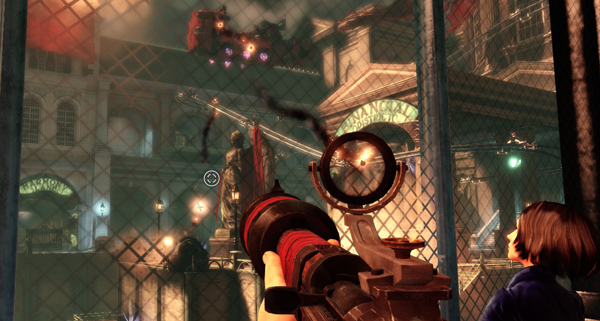
In only the most startling of plot twists, it turns out that Harmony Lane is woefully misnamed.
The full story is that, at one point in DeWitt’s life, the guilt of murdering a group of innocent non-whites at Wounded Knee compels him to seek forgiveness at a baptism. You know the kind – the ones that were really popular at the tail end of the 19th century. Oh, you don’t know? Well open a history text book, you lazy jerk. Anyway, this moment effectively splits the timeline – one in which DeWitt refuses the baptism and realizes he will never be forgiven, compelling him to become a despondent, gambling drunk.
The other is where he is ‘absolved’ of sin, and then imagines that if he is forgiven for such acts, It must have been God’s will to murder innocents! At which point, they weren’t innocent in the first place! And if that’s the case, wargle bargle white supremacy! I’m going to change my name to Comstock and build a flying city to worship a psychotic rendition of America’s past! I’m also going to hire the lady scientist responsible for my flying racist deathtrap to breach the walls of reality because I’m riddled with cancer and sterile so I need to steal an heir!
Yeah, there’s that. So, at some point in his being a drunk, DeWitt marries and procreates. Sadly, his wife dies in childbirth. Depressingly, he sells his daughter to Comstock to pay off his debts. In one of the most haunting scenes of the game, DeWitt tries to stop Comstock from escaping, only to see his daughter disappear beyond the dimensional rift. Being the kind of shitty human who would sell his own daughter, he brands her initials (AD) on his hand and then promptly buries the traumatic event in a bottle of booze. Probably.
Comstock, who is just a bit worse of a fuckstick than DeWitt, locks Elizabeth up in a tower to see the scope of her ability to manipulate time and space. Because she has this power, evidently. As time goes by and Elizabeth grows more powerful, Comstock eventually stops trusting the scientist responsible for reality bending and kills her. With only Prophet Beardy McNutjob to guide her development, Elizabeth is eventually turned into a broken vessel for her father’s message of fiery vengeance on the surface.
Unfortunately for the oh-so-wacky racist, it turns out that murdering a scientist so smart she can cross dimensional boarders and may or may not also be a wizard is not a good idea. She and her brother find DeWitt and contract him to find Elizabeth to wipe away more debt. Or maybe it’s the first round of debt. It’s hard to say, what with the chronological fuckery. Anyway, he gets to Columbia, rescues Elizabeth, and destroys the device responsible for ruining her day. So, the good guys win! Hooray!
No. No they do not.
See, there are thousands of realities where Comstock wins. And so long as there is one, every reality everywhere is threatened. When Elizabeth reveals the truth to you, there is only one thing left to do – DeWitt needs to die before his attempted baptism. Only in doing so can the lives of untold billions be saved. A group of possible Elizabeths pushes him under the water, drowning DeWitt before the camera pulls back and each one winks out of existence.
In many ways, not only is Bioshock Infinite one of my favorite games, it’s also in my top sci-fi stories. The way it unfolds is certainly not as straightforward as I presented it, and all that does is make the narrative even stronger. There are countless little human moments in there, revealing that DeWitt and Elizabeth have a connection beyond hero-and-princess-on-a-pedestal. And the way things are laid out, the story never gets confusing despite the layers it throws at the player.
Even the big twist – DeWitt and Comstock are the same dude and Elizabeth is their trans-dimensional daughter – was actually something I picked up on because of the way the two characters behaved toward one another. That, alone, should be more than enough to prove that the writing is above and beyond even what we’ve come to expect from films and a lot of novels. And, to the game’s infinite credit, even though I predicted part of the plot twist before it happened, I actively hoped that I was wrong because of what it would mean for the story.
And what it meant is that the story is a tragedy. I mean the one and only ‘happy’ ending is DeWitt drowning and saving humanity at the cost of his and his daughter’s lives. It’s so powerful and gut-wrenching on a multitude of levels. Here, you have a man who slaughters armies to save this girl he doesn’t even know, his estranged daughter, and despite his anger and self-destructive tendencies, we really do want him to win. Even if we didn’t connect to the guy because he feels like a real down on his luck slob, we are wearing his skin and have taken on the responsibility of being him.
Don’t you understand? We were supposed to be rewarded.
At the end of the day, nothing we did as Booker DeWitt will ever be remembered or sung about in pub gatherings. DeWitt’s death invalidates the Infinite timeline – rendering all events, people, and technologies moot. There is no war in Columbia, as there is no more Columbia to fight over. Outside of the fact that this means that all DLC is going to be narratively moot, it also means that the struggles of DeWitt and Elizabeth are ultimately meaningless, and at the same time, of the utmost importance.
I can’t really think of a moment that has been so tinged with despair. Sure, Halo: Reach and a smattering of others had an ending where everyone died, but the knowledge that humanity gets to go on is the reward. Also, players pretty much knew things were right fucked when they started playing the game. Infinite builds a foundation of adventure and excitement only to give you an ending that needs to happen for any kind of resolution that won’t involve an apocalypse of the heroes’ creation.
Therein, I think, is the reason why so many people have complained about the game. I think the story demanded that we ultimately face the consequences of actions, holding our faces in it, before yanking the rug from under our feet. The sense is that all these people think that Elizabeth and DeWitt should have walked off into the sunset or some other saccharine conclusion to reward them for succeeding. After all, the game demanded that the player violently dispatch countless minions to save Elizabeth, and we ultimately fail. The tragic ending has never really been so successful at extracting a toll from its audience outside of the final ending of Nier, where it erases your save games as a final ‘fuck you for playing.’
And I think that all the violence coupled with this being a tragedy made a lot of people unable to articulate why they were unhappy. They blamed it on the violence or pretension or whatever, but I think it comes down to the fact that games are supposed to reward violence. Gamers are used to shooting people in extravagantly horrific ways and getting a trophy. With Infinite, we slogged through a bloody revolution and horror to rescue the daughter we had abandoned and were asked for one final sacrifice. And that sacrifice was to not only lose ourselves and our struggle, but to lose the one we fought so hard to protect. There was no reward for the violence we inflicted on others, no matter how much we though they deserved it. In the end, their blood was nothing to the final outcome, just as our hero’s life became void.
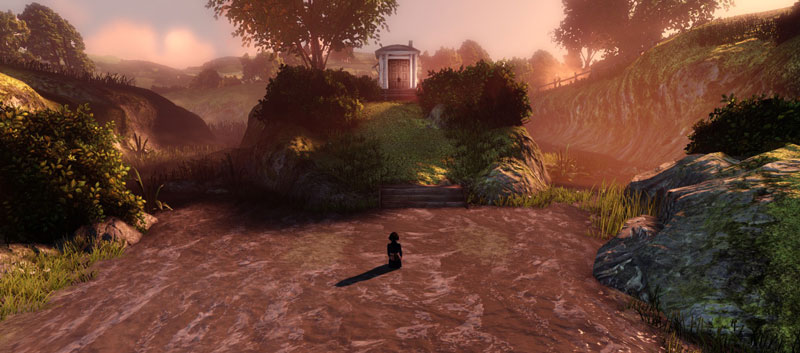
Aaaaaaaand we all die alone.
So buy the game already. It’s worth every moment.
< PREVIOUS ENTRY • NEXT ENTRY >
Advice • Fiction • Gaming • General Musings • Reviews


